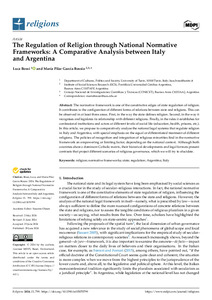Por favor, use este identificador para citar o enlazar este ítem:
https://repositorio.uca.edu.ar/handle/123456789/19158| Título: | The regulation of religion through national normative frameworks: a comparative analysis between Italy and Argentina | Autor: | Bossi, Luca García Bossio, María Pilar |
Palabras clave: | RELIGION; REGULACION; ESTADO | Fecha de publicación: | 2024 | Editorial: | Multidisciplinary Digital Publishing Institute | Resumen: | The normative framework is one of the constitutive edges of state regulation of religion. It contributes to the configuration of different forms of relations between state and religions. This can be observed in at least three areas. First, in the way the state defines religion. Second, in the way it recognises and legislates its relationship with different religions. Finally, in the rules it establishes for confessional institutions and actors at different levels of social life (education, health, prisons, etc.). In this article, we propose to comparatively analyse the national legal systems that regulate religion in Italy and Argentina, with special emphasis on the equal or differentiated treatment of different religions. The policies of recognition and integration of religious minorities find in the normative framework an empowering or limiting factor, depending on the national context. Although both countries share a dominant Catholic matrix, their historical developments and legal formats present contrasts that project different scenarios of religious governance, which we will try to elucidate. | Cobertura Espacial: | Argentina Italia |
URI: | https://repositorio.uca.edu.ar/handle/123456789/19158 | ISSN: | 2077-1444 (online) | DOI: | 10.3390/rel15070799 | Derechos: | Atribución 4.0 Internacional | Fuente: | Religions. 2024,15 (799) |
| Aparece en las colecciones: | Artículos |
Ficheros en este ítem:
| Fichero | Descripción | Tamaño | Formato | |
|---|---|---|---|---|
| regulation-religion-national.pdf | 375,88 kB | Adobe PDF |  Visualizar/Abrir |
Este ítem está sujeto a una Licencia Creative Commons

